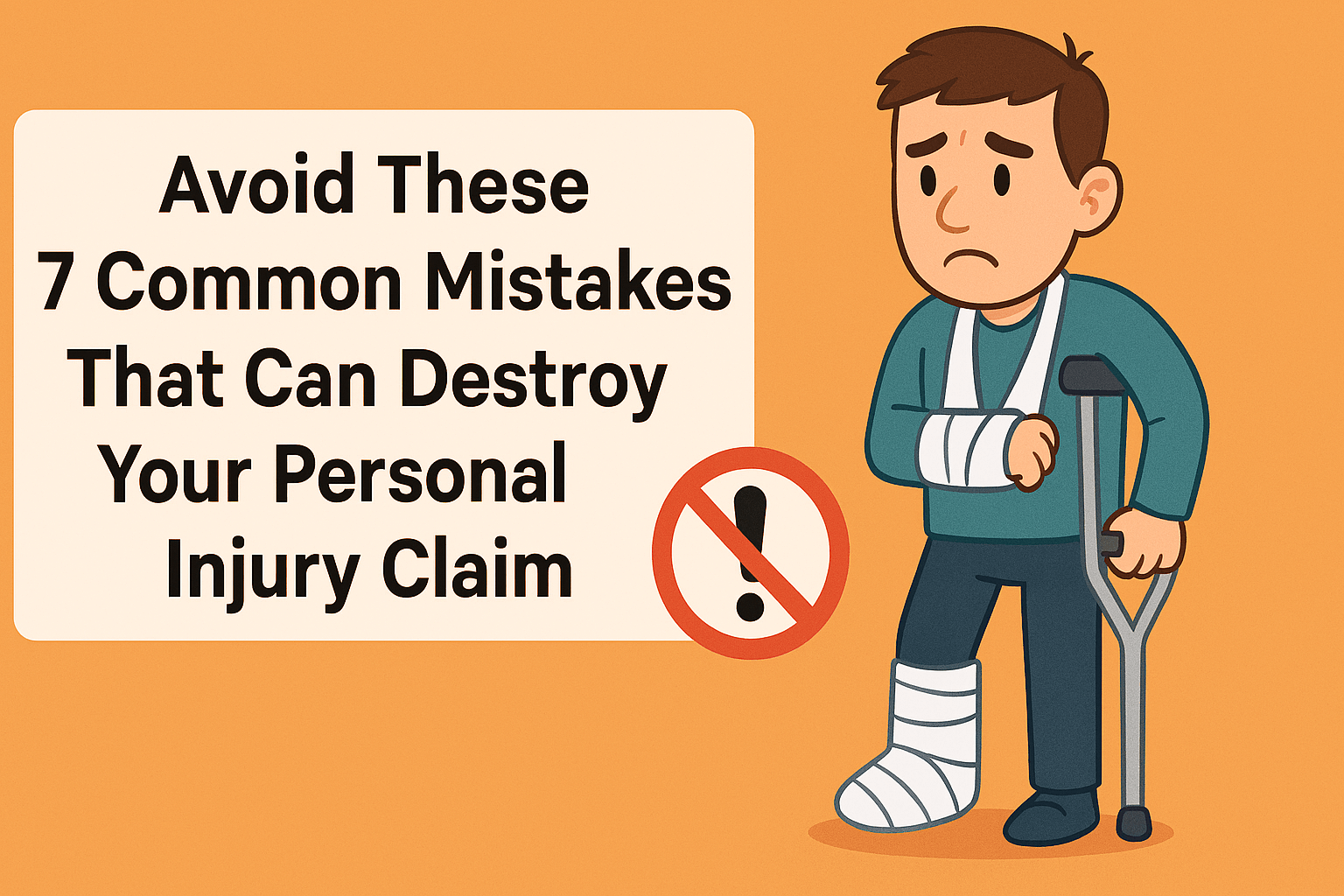

Avoid These 7 Common Mistakes That Can Destroy Your Personal Injury Claim
Introduction
When you've been injured due to someone else's negligence, the last thing you want is to inadvertently damage your own case. Unfortunately, many accident victims unknowingly make critical mistakes that can significantly reduce their compensation or even destroy their personal injury claim entirely. Understanding these common pitfalls can mean the difference between a successful settlement and walking away empty-handed.
Personal injury law is complex, and insurance companies have teams of experienced adjusters and lawyers working to minimize payouts. By avoiding these seven crucial mistakes, you'll be better positioned to protect your rights and secure the compensation you deserve.
Mistake #1: Delaying Medical Treatment or Skipping Follow-Up Care
The Problem
One of the most damaging mistakes you can make is failing to seek immediate medical attention or neglecting to follow through with recommended treatment. Many people feel "fine" immediately after an accident due to adrenaline, or they may worry about medical costs.
Why It Destroys Your Claim
- Creates doubt about injury severity: Insurance companies will argue that if you were truly injured, you would have sought immediate care
- Breaks the causal chain: Delays allow insurers to claim your injuries were caused by something other than the accident
- Suggests non-compliance: Skipping appointments or treatments implies your injuries aren't serious
What You Should Do Instead
- Seek medical attention immediately, even if you feel okay
- Follow all doctor recommendations and treatment plans
- Attend every scheduled appointment
- Keep detailed records of all medical visits and expenses
- Don't let cost concerns prevent you from getting necessary care
Mistake #2: Giving Recorded Statements to Insurance Companies
The Problem
Insurance adjusters often contact accident victims quickly, presenting themselves as helpful and requesting a recorded statement "just to get the facts straight." They may pressure you to give a statement immediately while you're still in pain or under medication.
Why It Destroys Your Claim
- Statements can be taken out of context: Even innocent comments can be twisted to harm your case
- You may not know the full extent of your injuries yet: Early statements might downplay injuries that worsen over time
- Legal traps: Adjusters are trained to ask leading questions that can damage your claim
- Permanent record: Once recorded, these statements can be used against you throughout the legal process
What You Should Do Instead
- Politely decline to give recorded statements
- Refer all communication to your attorney if you have one
- If you must communicate, do so in writing
- Never admit fault or speculate about what happened
- Keep conversations brief and factual
Mistake #3: Posting on Social Media
The Problem
In today's digital age, it's natural to share life updates on social media. However, posting about your accident, injuries, or activities can provide insurance companies with ammunition to use against you.
Why It Destroys Your Claim
- Evidence of activity: Photos showing you engaged in physical activities can contradict injury claims
- Mood and demeanor: Happy posts can be used to argue you're not suffering emotionally
- Inconsistent statements: Social media posts may contradict your legal claims
- Privacy invasion: Insurance companies regularly monitor claimants' social media accounts
What You Should Do Instead
- Avoid posting anything related to your accident or injuries
- Set all social media accounts to private
- Don't post photos or updates about activities, travel, or social events
- Ask friends and family not to tag you in posts
- Consider taking a social media break during your case
Mistake #4: Accepting the First Settlement Offer
The Problem
Insurance companies often make quick, lowball settlement offers hoping you'll accept before understanding the full value of your claim. These initial offers rarely reflect the true cost of your injuries and damages.
Why It Destroys Your Claim
- Undervalues your claim: First offers typically only cover immediate medical bills, ignoring future costs
- Permanent resolution: Once you accept and sign a release, you cannot seek additional compensation
- Ignores non-economic damages: Initial offers often exclude pain and suffering, emotional distress, and quality of life impacts
- Doesn't account for long-term effects: Some injuries have complications that develop over time
What You Should Do Instead
- Never accept the first offer without careful consideration
- Consult with a personal injury attorney to understand your claim's value
- Wait until you reach maximum medical improvement before settling
- Consider all types of damages: medical expenses, lost wages, pain and suffering, and future costs
- Negotiate based on the full scope of your damages
Mistake #5: Failing to Document Everything
The Problem
Many accident victims don't realize the importance of thorough documentation from day one. They may rely on memory or assume others will handle the paperwork properly.
Why It Destroys Your Claim
- Weakens evidence: Poor documentation makes it harder to prove your case
- Memory fades: Details become fuzzy over time, reducing credibility
- Missing crucial evidence: Important details may be lost forever
- Burden of proof: In personal injury cases, you must prove your damages
What You Should Do Instead
- Take photos of the accident scene, your injuries, and property damage
- Keep detailed records of all medical treatments and expenses
- Maintain a daily journal documenting your pain levels and limitations
- Collect contact information from witnesses
- Save all receipts related to your injury (medical bills, transportation costs, etc.)
- Document lost wages and missed work opportunities
Mistake #6: Handling the Case Without Legal Representation
The Problem
Some people try to handle their personal injury claims alone, thinking they'll save money on attorney fees or that their case is straightforward enough to manage independently.
Why It Destroys Your Claim
- Lack of legal knowledge: Personal injury law is complex with many nuances
- Unequal negotiation: You're up against experienced insurance professionals
- Procedural mistakes: Missing deadlines or filing requirements can end your case
- Undervaluing claims: Without legal training, you may not recognize all available damages
- Settlement pressure: Insurance companies may take advantage of unrepresented claimants
What You Should Do Instead
- Consult with a qualified personal injury attorney early in the process
- Choose an attorney with specific experience in your type of case
- Understand that most personal injury attorneys work on contingency fees
- Let your attorney handle all communication with insurance companies
- Focus on your recovery while your attorney manages the legal aspects
Mistake #7: Missing Critical Deadlines
The Problem
Personal injury claims are subject to strict time limits called statutes of limitations. Additionally, there may be other procedural deadlines throughout the legal process that, if missed, can end your case.
Why It Destroys Your Claim
- Statute of limitations: Missing this deadline means losing your right to sue forever
- Procedural deadlines: Courts may dismiss cases for failing to meet filing requirements
- Evidence deterioration: Delays can result in lost evidence and witnesses
- Weakened position: Late filings may suggest lack of seriousness about your claim
What You Should Do Instead
- Learn your state's statute of limitations for personal injury cases
- Act promptly after your accident
- Keep track of all important dates and deadlines
- Work with an attorney who maintains a comprehensive calendar system
- Don't wait until you feel "ready" to pursue your claim
Additional Red Flags to Avoid
Exaggerating Your Injuries
While you want to fully communicate your pain and limitations, exaggerating symptoms can backfire if discovered through medical examinations or surveillance.
Inconsistent Stories
Make sure your account of the accident remains consistent across all statements, reports, and testimony. Inconsistencies raise credibility concerns.
Ignoring Doctor's Orders
Failing to follow medical advice not only hurts your health but also gives insurance companies ammunition to argue you're not taking your injuries seriously.
Talking to the Other Party's Insurance
Their insurer is not on your side. All communication should go through your attorney or your own insurance company.
The Path Forward: Protecting Your Claim
Successfully navigating a personal injury claim requires attention to detail, patience, and often professional legal guidance. By avoiding these seven critical mistakes, you significantly improve your chances of obtaining fair compensation for your injuries and losses.
Remember that insurance companies are businesses focused on minimizing payouts. They have resources, experience, and strategies designed to reduce what they pay you. Your best defense is knowledge, proper documentation, and qualified legal representation when needed.
Key Takeaways
- Seek immediate medical care and follow all treatment recommendations
- Avoid giving recorded statements to insurance companies
- Stay off social media or be extremely cautious about what you post
- Don't accept the first settlement offer without careful evaluation
- Document everything related to your accident and injuries
- Consider hiring qualified legal representation
- Be aware of all deadlines and act promptly
Your personal injury claim may be your only opportunity to recover compensation for your injuries, lost wages, and pain and suffering. Don't let avoidable mistakes prevent you from getting the justice and compensation you deserve.
Disclaimer: This article is for informational purposes only and does not constitute legal advice. Personal injury law varies by state, and every case is unique. Consult with a qualified personal injury attorney in your jurisdiction for advice specific to your situation.










